Navigating internships during a pandemic
Internships and other summer experiences have always been crucial for Honors College students. It’s a critical time to get experience in your field and benefit from learning outside of the classroom by immersing yourself in a new environment.
Due to the COVID-19 pandemic, internships and summer experiences had to shift this year. While many internships and experiences were canceled, some switched to a virtual model and others still took place in person, but with stricter protocols and safety measures.
Building Connections
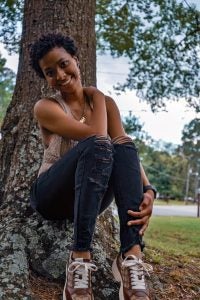
Dymon Blango (Submitted photo)
Dymon Blango spent over 300 hours this summer interning with Harvard University’s Bioinformatics team as part of a research experience for undergraduate (REU) students. Blango’s internship was entirely virtual and she learned more about coding using R, communicating research ideas effectively over the internet, and more about different career options in biology.
“Over the summer I worked virtually, to identify unknown pieces of chromosomes from species of brood parasitic birds. Using bioinformatics, I was able to successfully decipher the chromosomes as W-linked, Z-linked, or autosomal.”
Blango said that this experience was different than any other because of its virtual format. Before the pandemic, she was supposed to stay on Harvard’s campus for the duration of the internship. She said that she was grateful the program ran as smoothly as it did.
“This experience has helped me in my academic and career journey by teaching me how to adapt under sudden conditions. I have learned that things don’t always go as planned and we must be willing and prepared to change plans no matter what. This lesson was well learned and has helped me understand and view things in life as more temporary than they seem.”
Solidifying Decisions
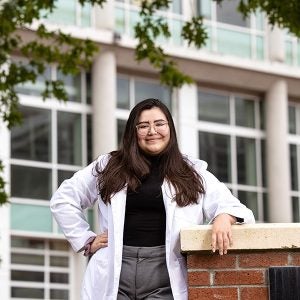
Chemistry and Physics major Melany Contreras. (Photo by Rhett Butler)
Melany Contreras’ research internship at Rutgers University was a truly unique experience.
“I have studied abroad and have had several jobs ranging from being a server to teaching a lab course. None of them compare to my internship at Rutgers. I learned the most from this internship – not only in the research knowledge I gained but also in what I learned about myself.”
During the RISE at Rutgers program, Contreras performed research with Dr. Lu Wang in the Department of Chemistry and Chemical Biology. She also took part in enrichment opportunities that included workshops, seminars, and GRE prep. In six weeks, Contreras learned computational chemistry and molecular dynamics simulations. Outside of the lab, she learned how to navigate research in a virtual world and how to adapt to new and challenging circumstances as well as the graduate school application process.
“This internship has done a lot of solidifying in the decisions I have made regarding graduate school and my desired career. I have immersed myself in a new area of research that I now love and intend to immerse myself further in going into graduate school. My desire for a Ph. D. has never been stronger, and I have gained a new confidence that I will be successful in obtaining this Ph. D. and with what lies beyond in my research career.”
Learning to Adapt
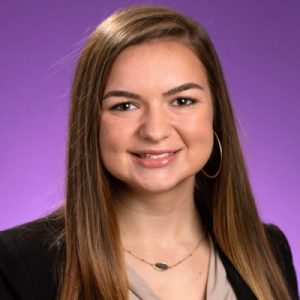
Shaelyn Raleigh
This summer, Shaelyn Raleigh learned the importance of adaptability and being able to change her expectations during her term with AmeriCorps.
When she found out that she would be working with AmeriCorps, Raleigh knew she was going to help enhance STEM education for underprivileged children in Greenville. However, that changed when schools and after-school programs were closed due to the pandemic.
“This meant I had to get creative to still complete my 450 hours by the deadline,” Raleigh said. “I ended up doing a wide variety of things in order to meet the program requirements.”
A few of these activities were volunteering for the Crisis Cleanup hotline, making a YouTube channel for kids to access videos at home, and completing training sessions. Starting in July, Raleigh was able to start working with kids again at summer enrichment camps at South Greenville Rec.
“I am someone who likes to have everything planned out, so this was a good growing experience for me and taught me to ‘go with the flow’ a little more than I typically like to. I also learned how it is important to keep an open mind and be willing do things that might be unexpected and uncomfortable at first.”
Raleigh said that this experience helped her by giving her connections and potential job offers.
“Working with underserved kids is something that I am passionate about so having these relationships is important to me. I know that I want to work with this demographic in the future so building this network in the community now will help me progress with this later.”
Virtual Immersion
Learning how important critical thinking is to every part of the research process was one of Logan Long’s main takeaways from her virtual research experience at Vanderbilt University.
During the ten-week Vanderbilt PACER-SURE program, Long took a Planning your Scientific Journey course where she learned how to develop a process for research and a digital science communication course.
“We learned how to communicate to a lay audience, decipher scientific writing, and utilize graphics/visuals to tell scientific stories. This can be applied to the research I did with my group Heart Worth a Lifetime, where we used animation to explain our topic of maternal smoking leading to preterm births and the effects on babies with Congenital Heart Disease.”
Long said that this summer was one of her most memorable experiences. At first, she wasn’t sure if the program was going to continue and if it did, how it would pan out.
“Although my fellow scholars and I couldn’t interact in person, Vanderbilt still made this program as immersive as possible with the use of mentors, speakers of different professions, and the utilization of multiple communication platforms like zoom, slack, and mural.”
Vanderbilt’s program was Long’s first experience with research, unlike the other premedical programs she has participated in.
“I felt it was just as fulfilling as hands-on experience, and I’ve grown as an individual in this program. As a future physician, I must possess critical thinking skills taught in the program since the basis of many health care solutions is out of the box thinking. Overall, in one sentence I would describe this program as one of the most transformational experiences I’ve had in my lifetime.”
Positive Influence
Kristina Whitley’s summer experience still took place in-person but with several alterations. Whitley spent her summer as a camp counselor and worked with children in programming and recreation activities, such as training in ziplines, paintball, bazooka ball, lifeguarding, skits, and sharing personal testimonials in small and large groups
“I learned how much children look up to teenagers and young adults our age. This allowed me to understand the influence and power I have over other human beings and taught me to take that responsibility and handle it with care. I learned that even though circumstances have not been the best and it’s easy to be negative, to try to stay positive and find activities and minute things that incorporate positive fun.”
This was Whitley’s second summer working at the camp and the day-to-day activities were vastly different. Masks had to be worn when you were within 10 feet of campers and seating was spaced out.
“We did try to make social distancing fun by enforcing a ‘SQUAWK’ rule. When anyone yelled out ‘SQUAWK’ everyone had to hold out their arms and make sure they could not touch anyone 360 degrees around them. This was an example of a way we tried our best to still make the summer fun, while also being safe.”
Whitley said learning how to communicate with both adults and children was a major takeaway from this summer.
“I will learn how to add my ideas to the table, while also valuing other’s opinions and suggestions. It will also help me to remember to always INTENTIONALLY look for the little things to still keep life fun and interesting.”
Dynamic Challenge
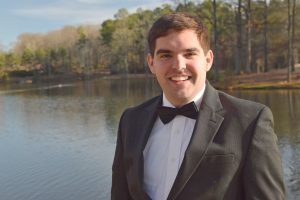
William Guiler (Submitted photo)
Valuable insight into the pharmaceutical industry shaped William Guiler’s career goals during his summer at Merck as a genetics and pharmacogenomics intern.
“There was something unique, however, about joining a company outside of Greenville and North Carolina — a region I have lived in for almost my entire life. Although I never made it Boston, I gained exposure to new cultures, ways of life, and experiences that are not as pervasive in Greenville.”
During his time at Merck, Guiler performed research under the mentorship of Dr. Qun Lu in the areas of computational biology and bioinformatics. He met an array of scientists during his virtual internship while writing an R script to assist with data analyses, contributing to an R code for imaging analysis, giving a presentation on Super-Resolution microscopy and helping with a course on Drug Discovery for high school students.
“I learned how to be flexible. I learned how to ask for help from those above me. I learned how to work collaboratively not for a grade, but for developing drugs that will save lives. I learned more about myself too and how I had certain strengths and weaknesses I had not known before. I gained insight into my career trajectory and how to navigate the field of science during COVID-19. I also learned how superior ECU is at preparing students for internships and jobs. I worked with students with far more impressive applications that came from “top-tier” schools, but ECU- my professors, mentors, advisors- all prepared me to excel. Thus, I have gained an even great appreciation for ECU and the Honors College.”
Humbling Volunteering
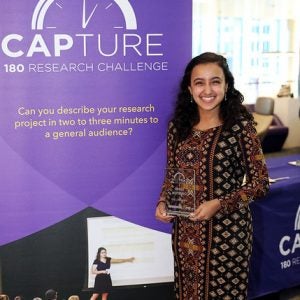
Naimi Pothiwala (Photo by Kristen Martin)
Some of our students delved into volunteer work this summer when in-person activities were canceled. Naimi Pothiwala applied to become a United Nations volunteer with Social Development International, a non-profit focused on sub-Saharan Africa.
The non-profit was starting a global COVID-19 support center and recruited volunteers from across the globe.
“Working with healthcare providers from different countries and getting to hear their perspectives about the pandemic and all of the different ways that communities are approaching the virus has been incredibly informative and also really humbling.”
As part of her volunteer work, Pothiwala helped created educational content geared towards vulnerable populations in Cameroon. During this first phase of the project, her team worked towards creating a fully-functioning free virtual medical clinic with telemedicine visits for COVID-19 patients who can’t afford doctor visits; a hotline for patients around the world to learn what to do when testing positive; educational modules to improve health literacy about the virus; and resource centers in Cameroon to provide basic supplies like masks and hand sanitizers.
“It’d be hard to compare to my other experiences in college, because it was so different in that it was entirely virtual and during a pandemic, working to address the pandemic. Overall though it really helped me expand my view of public health, and what health disparities exist in the world. I always saw these issues in the context of North Carolina, and the people/culture of our surroundings, and this really forced me to step out of that bubble I’ve created for myself.”
Hands-on Problem-solving
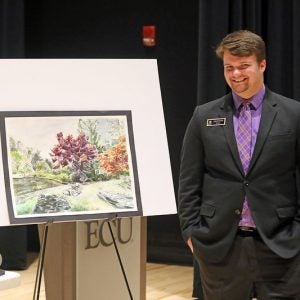
Jordan Hock (Photo by Kristen Martin)
Jordan Hock spent the summer delving into everything dealing with boat building at Grady White Boats.
“I’ve been involved in everything from hull fabrication to final finishing. My department is prototype engineering, so I’ve seen a lot of problems met with innovative solutions.”
A few of the things Hock worked on this summer were wiring harnesses and creating and modifying jigs, overlays, and parts. He even did a little woodworking and was exposed to a variety of tools, materials, and processes.
“I really got the experience that I was at Grady White to learn. I’ve never worked a place quite like it. I’m encouraged to ask questions and work on something different almost every day.”
Hock said his experience was very hands-on and problem-solving fun while giving him a broad look at different aspects of engineering.
“I think this experience has given me many tools for problem solving that I can use universally.”
Furthering Interests
Shaun Gizdic was able to dive deeper into the business world during his seven-week internship with tekMountain in Wilmington, N.C. this summer. During this fully virtual internship, he learned what a business incubator does and who uses them as well as interviewed local entrepreneurs, Forbes magazine award winners, and employees of tekMountain and its parent company, CastleBranch.
“I was able not only to better learn about the business world, but I was able to explore my own interests within the business world,” he said. “I’ve worked a normal retail job before but furthering my interests and progress over this summer was such a better experience.”
Gizdic said he has made connections that will benefit his future career.
“I am still in contact with many of the teammates I worked with and am still involved in upcoming projects this year. That’s a big deal, as I’m still a college student but somehow making a difference in Wilmington’s entrepreneurship.
“I spent this summer further growing myself and discovering interests I may have, as well as the beginning works of being part of a team looking to change Wilmington’s entrepreneurship scene forever.”
